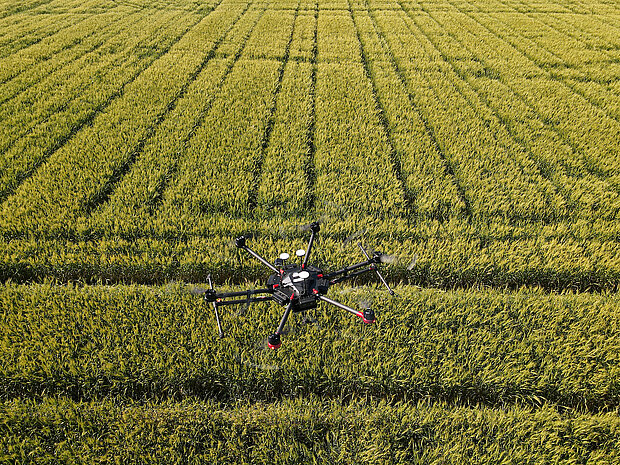
A course focusing on flying drones commercially is being offered for the first time this fall through NDSU’s Department of Agricultural and Biosystems Engineering.
The course – Precision Agriculture 291, Drone Pilots for Agricultural Operations – is a trial course in the Precision Ag curriculum. The course is taught by Nadia Delavarpour, post-doctoral research assistant, under the supervision of Paulo Flores, assistant professor.
As pilots send unmanned aircraft systems, known as UAS, skyward for commercial use, Federal Aviation Administration requirements must be met. The course’s objective is to give an in-depth, hands-on opportunity for students to prepare for and pass the FAA Part 107 commercial drone pilot’s license test.
That includes how to get detailed information regarding air spaces, air space classifications, applicable regulations for each classification, preparing certain FAA reports, operating requirements, flight restrictions, weather and other topics.
“We go through all the aeronautical knowledge topics created by the FAA,” Delavarpour said.
The class also includes two field experiences for students to fly drones. One includes a session during which the students fly the drones manually without apps or software, while the second session allows students to fly the drones autonomously using apps without human interference.
Students in the precision ag degree program take classes related to data mapping, remote data analysis and site-specific agriculture using aerial data collection, such as drone imagery, but that data must first be collected through UAS applications.
"With the use of drones, it is possible to get an overview of fields and collect data much faster and more efficiently than traditional methods. The basic need is to be able to gather the data for this purpose,” Delavarpour said.
Drones also are being used in a variety of ways, including wildlife and historical conservation, construction, surveillance and in the military. Students in the class are studying computer science, agricultural and biosystems engineering, ag systems management, precision ag and general agriculture.
Pilots flying drones heavier than 55 pounds or flying commercially must have a license. Farmers using drones for spraying must also obtain certain waivers and permissions.
“This course is to make sure nobody is violating any rules and regulations and to ensure the remote pilot in command understands the regulations, operating requirements and procedures for safely flying drones for the drone itself and for people who are in the area of operation,” Delavarpour said.
According to the Association for Unmanned Vehicle Systems International, the drone industry is expected to create more than 100,000 jobs and provide more than $82 billion in economic impact by 2025 in the United States.
As a student-focused, land-grant, research university, we serve our citizens.